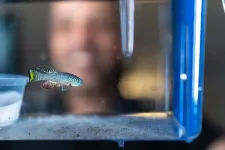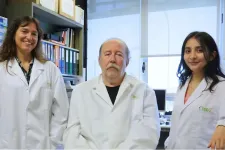(Press-News.org) The Wyss Institute for Biologically Inspired Engineering at Harvard University announced today that Circe, a startup developed at the Institute and spun out of Harvard, has signed a worldwide, exclusive licensing agreement coordinated by Harvard’s Office of Technology Development (OTD) to commercialize a novel bioproduction technology that could significantly reduce the carbon emissions of industries from food to aviation fuel.
Circe has raised more than $8 million to date from investors including Regen Ventures, Undeterred Capital, Ponderosa Ventures, Bee Partners, and Elementum Ventures.
“One of the great challenges humanity faces is how to maintain global growth and production and decarbonize everything at the same time. Circe is addressing this critical problem by using gas fermentation to manufacture the products and molecules we need in a carbon-negative way,” said Shannon Nangle, Ph.D., who co-founded Circe along with fellow Wyss member Marika Ziesack, Ph.D.
Developed in the lab of Wyss Core Faculty member Pamela Silver, Ph.D., Circe’s technology grows microbes on gasses like carbon dioxide --- in the same way plants grow --- and harvests the molecules they build. Nangle and Ziesack used synthetic biology to tweak the metabolisms of certain microbes that naturally “eat” greenhouse gasses so that they use those gases to manufacture molecules that are valuable to many industries. Their platform has produced molecules identical to those that make up sugars, fats, biodegradable plastics, and biofuels, all using only CO2, water, and electricity as inputs.
“In order to ensure that the Earth is habitable for future generations of humans, we urgently need to decarbonize industries and start reversing the damage we’ve caused to the planet. Microbes are wonderful living machines that we can leverage to produce the things we need for everyone to live a happy, comfortable life while reducing pollution, land use, and fossil fuel consumption,” said Silver, who is also the Elliot T. and Onie H. Adams Professor of Biochemistry and Systems Biology at Harvard Medical School (HMS).
Circe’s first products in development are triglycerides: the molecules that make up the fats, butters, and oils that we eat and use every day. The team has used their triglycerides to make the world’s first gas fermentation-derived chocolate, which - given the worldwide shortage of cocoa in the 2023-2024 growing season - could provide a solution to global food supply chain interruptions. In addition, this proof-of-concept enables the production of food products in any region, reducing the industry’s carbon footprint.
The Circe team is also exploring other types of fats, including milkfat that can add creaminess to both dairy and non-dairy milk products, and palm oil that can be used across the food and cosmetics industries, as well as for sustainable fuels.
Circe’s fermentation platform was created and significantly de-risked at the Wyss Institute through the Institute’s validation pipeline, which provides aspiring entrepreneurs with the resources and support they need to transition their teams and technologies from the lab to the real world. Based on its potential for significant positive impact, it was named an Institute Project in 2021 and provided additional funding from the Wyss to expedite its commercialization.
Over the course of Circe’s development, the team won several accolades in recognition of its innovative concept. While at the Wyss, they were awarded $3.2 million from the US Department of Energy’s ARPA-E ECOSynBio program, and Nangle and Ziesack were named 2021 Activate Fellows. After the company spun out of Harvard, Nangle was named an “Innovator Under 35” by MIT Tech Review.
“For centuries, humans’ relationship with Nature has been dominated by extraction, destruction, and consumption. A paradigm shift to one of conservation, regeneration, and co-production using Nature's building materials rather than harsh chemicals is starting to happen, but at much too slow a pace. The Circe team’s technology has the potential to speed up the transition to a future in which we work with Nature to produce what we need, rather than exploiting it,” said Don Ingber, M.D., Ph.D., the Wyss Institute’s Founding Director. Ingber is also the Judah Folkman Professor of Vascular Biology at HMS and Boston Children’s Hospital, and the Hansjörg Wyss Professor of Bioinspired Engineering at Harvard’s John A. Paulson School of Engineering and Applied Sciences (SEAS).
END
Circe Bioscience licenses technology to decarbonize industry with microbes developed at Wyss Institute at Harvard University
Novel gas fermentation approach enables engineered microbes to eat greenhouse gases and produce valuable products for multiple uses
2024-05-15
ELSE PRESS RELEASES FROM THIS DATE:
Parasitic worm likely playing role in decline of moose populations
2024-05-15
PULLMAN, Wash. – A parasitic worm that can infest the brains of moose appears to be playing a role in the decline of the iconic animal in some regions of North America.
Moose populations have been dwindling for years across the country due to many contributing factors, but new research at Washington State University has found the impact of Eleaophora schneideri, also known as the arterial worm, has likely been underestimated.
Researchers examined recently deceased Shiras moose in Idaho between March 2020 and July 2022. While the parasitic roundworm E. schneideri was not detected in any of the animals found in north Idaho, it was present in 10 of ...
Transcatheter valve replacement outcomes similar to surgery
2024-05-15
A new study demonstrated parity between a minimally invasive procedure to replace the aortic valve in the heart—transcatheter aortic valve replacement (TAVR)—and surgical aortic valve replacement (SAVR).
In the meta-analysis of seven randomized trials, published in JSCAI and presented at the 2024 EuroPCR conference in Paris, France, researchers compared the outcomes of 7,785 patients undergoing TAVR (a procedure that delivers a new aortic valve into the heart through a catheter) to those undergoing SAVR for severe aortic stenosis. ...
Germline regulation and sex differences: How they impact lifespan in vertebrates
2024-05-15
The study revealed unexpected and sex-specific effects of germline regulation on longevity and somatic repair in vertebrates. Contrary to classical evolutionary theories, it turns out that changing how the germline (the part responsible for reproduction) works can have different effects on males and females. This challenges conventional beliefs that reproduction and longevity are linked by a limited pool of resources. The research opens up new possibilities for understanding how our bodies age and the role of reproduction in that process. The findings ...
Detection of an Earth-sized exoplanet orbiting the ultracool dwarf star SPECULOOS-3
2024-05-15
The SPECULOOS project, led by the astronomer Michaël Gillon from the University of Liège, has just discovered a new Earth-sized exoplanet around SPECULOOS-3, an "ultracool dwarf" star as small as Jupiter, twice as cold as our Sun, and located 55 light-years from Earth. After the famous TRAPPIST-1, SPECULOOS 3 is the second planetary system discovered around this type of star.
Ultra-cool dwarf stars are the least massive stars in our Universe, similar in size to Jupiter, more than twice as cold, ten times less massive and a hundred times less ...
Scientists discover blood proteins that may give cancer warning 7 years before diagnosis
2024-05-15
Two Cancer Research UK-funded studies from Oxford Population Health have discovered proteins in the blood that could warn people of cancer more than seven years before it is diagnosed.
Scientists identified 618 proteins linked to 19 different types of cancer, including 107 proteins in a group of people who blood was collected at least seven years before diagnosis.
The team have discovered that these proteins could be involved at the very earliest stages of cancer, where it could be prevented.
They ...
Astronomers discover new Earth-sized world orbiting an ultra-cool star
2024-05-15
A new, Earth-sized planet orbiting an ultra-cool red dwarf star, has been detected by an international team of astronomers – just 55 light years away.
The planet is only the second of its kind to be discovered around this type of star. Called SPECULOOS-3 b, it takes around 17 hours to complete an orbit of the star which is more than twice as cold as our sun, as well as ten times less massive and a hundred times less luminous.
Days and nights on SPECULOOS-3 b seem to be endless: the planet is likely to be tidally locked, so the same side – the ‘dayside’ – always faces the star in a relationship similar to our moon and Earth.
The ...
New biomarker to diagnose Alzheimer's in asymptomatic stages
2024-05-15
A recent study led by the Molecular and Cellular Neurobiotechnology group at the Institute for Bioengineering of Catalonia (IBEC) and the University of Barcelona has identified a new biomarker for Alzheimer's disease in asymptomatic stages of the disease. The molecule is miR-519a-3p, a microRNA directly linked to the expression of the cellular prion protein (PrPC), which is deregulated in people suffering from some neurodegenerative diseases such as Alzheimer's.
The search for biomarkers that are stable and easily detectable in biofluids, ...
Research sheds light on how proteins linked to Alzheimer’s disease influence neuronal growth
2024-05-15
New research has shed light in the complex interplay between cell proteins, and how they impact on neurons in neurodevelopmental disorders and Alzheimer’s disease.
A new study led by the University of Exeter and published in Royal Society Open Biology has discovered the key role that the protein Contactin-4 (encoded by the gene CNTN4) plays in shaping neurons.
The researchers began studying CNTN4 because it was known to have a role in autism, but its functional roles were not well understood. The team explored how CNTN4 functions within the brain, particularly its interactions with proteins involved in neurodegenerative diseases like Alzheimer's ...
Early retirement of old vehicles won't save the planet: A study
2024-05-15
Lifespan caps for passenger vehicles have limited effect on reducing greenhouse gas emissions and could drive up costs and material use finds a new study published in Environmental Research: Infrastructure and Sustainability. The research shows that although Light-Duty vehicles (LDVs) contribute 17% to the annual greenhouse gas emissions in the United States, imposing a 15-year lifespan cap on LDV fleets under a business-as-usual scenario will not lead to any meaningful reductions in GHG emissions.
To combat delayed uptake of Electric Vehicles (EVs), some have argued for limits on the vehicle’s ...
EuroPCR 2024 – Short-term data from NOTION-2: TAVR versus SAVI for younger patients with aortic stenosis
2024-05-15
Paris, France, 14-17 May 2024. The Course Directors have selected 3 major Late Breaking Trials (LBTs) that will be presented for the first time during the 2024 edition of EuroPCR. These trials were selected on account of their design, outcomes and potential to influence daily clinical practice. Among them is the NOTION-2 randomised clinical trial (RCT).
Background
Evidence comparing the use of transcatheter aortic valve implantation (TAVI) and surgical aortic valve replacement (SAVR) in low-risk patients with aortic ...
LAST 30 PRESS RELEASES:
Cal Poly’s fifth Climate Solutions Now conference to take place Feb. 23-27
Mask-wearing during COVID-19 linked to reduced air pollution–triggered heart attack risk in Japan
Achieving cross-coupling reactions of fatty amide reduction radicals via iridium-photorelay catalysis and other strategies
Shorter may be sweeter: Study finds 15-second health ads can curb junk food cravings
Family relationships identified in Stone Age graves on Gotland
Effectiveness of exercise to ease osteoarthritis symptoms likely minimal and transient
Cost of copper must rise double to meet basic copper needs
A gel for wounds that won’t heal
Iron, carbon, and the art of toxic cleanup
Organic soil amendments work together to help sandy soils hold water longer, study finds
Hidden carbon in mangrove soils may play a larger role in climate regulation than previously thought
Weight-loss wonder pills prompt scrutiny of key ingredient
Nonprofit leader Diane Dodge to receive 2026 Penn Nursing Renfield Foundation Award for Global Women’s Health
Maternal smoking during pregnancy may be linked to higher blood pressure in children, NIH study finds
New Lund model aims to shorten the path to life-saving cell and gene therapies
Researchers create ultra-stretchable, liquid-repellent materials via laser ablation
Combining AI with OCT shows potential for detecting lipid-rich plaques in coronary arteries
SeaCast revolutionizes Mediterranean Sea forecasting with AI-powered speed and accuracy
JMIR Publications’ JMIR Bioinformatics and Biotechnology invites submissions on Bridging Data, AI, and Innovation to Transform Health
Honey bees navigate more precisely than previously thought
Air pollution may directly contribute to Alzheimer’s disease
Study finds early imaging after pediatric UTIs may do more harm than good
UC San Diego Health joins national research for maternal-fetal care
New biomarker predicts chemotherapy response in triple-negative breast cancer
Treatment algorithms featured in Brain Trauma Foundation’s update of guidelines for care of patients with penetrating traumatic brain injury
Over 40% of musicians experience tinnitus; hearing loss and hyperacusis also significantly elevated
Artificial intelligence predicts colorectal cancer risk in ulcerative colitis patients
Mayo Clinic installs first magnetic nanoparticle hyperthermia system for cancer research in the US
Calibr-Skaggs and Kainomyx launch collaboration to pioneer novel malaria treatments
JAX-NYSCF Collaborative and GSK announce collaboration to advance translational models for neurodegenerative disease research
[Press-News.org] Circe Bioscience licenses technology to decarbonize industry with microbes developed at Wyss Institute at Harvard UniversityNovel gas fermentation approach enables engineered microbes to eat greenhouse gases and produce valuable products for multiple uses



